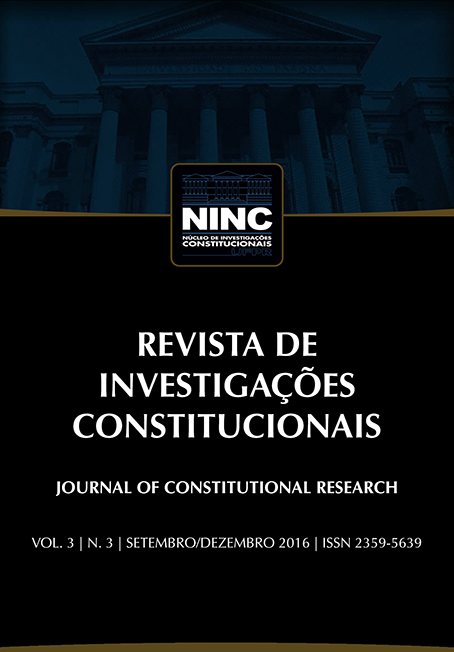Regulando a incerteza: a construção de modelos decisórios e os riscos do paradoxo da determinação
DOI:
https://doi.org/10.5380/rinc.v3i3.48159Palavras-chave:
incerteza, regulação, metodologia de construção de teorias, modelos decisórios, paradoxo da determinaçãoResumo
O objetivo deste trabalho é apresentar e explorar os problemas decorrentes da desconsideração de diagnósticos sobre o funcionamento da realidade em teorias normativas – sobretudo teorias sobre a tomada de decisão judicial. Esses não são problemas de natureza conceitual ou empírica, mas de natureza metodológica. Levá-los a sério é importante para que os diálogos entre teorias jurídicas normativas e as explicações fornecidas por outras ciências sobre o comportamento de determinados atores (como juízes) sejam metodologicamente rigorosos e, assim, possam produzir resultados efetivamente relevantes no domínio do direito.
Referências
ALEXY, Robert. Hauptelemente einer Theorie der Doppelnatur des Rechts. ARSP, [s.l.], vol. 95, n. 2, p. 151-166, abr. 2009.
ALEXY, Robert. The nature of arguments about the nature of law. In: MEYER, Lukas, PAULSON, Stanley L. & POGGE, Thomas Winfried Menko (Eds.). Rights, Culture, and the Law: Themes From the Legal and Political Philosophy of Joseph Raz. Oxford: Oxford University Press, 2003.
ALEXY, Robert. Theorie der juristischen Argumentation. 2. ed. Frankfurt a.M.: Suhrkamp, 1991.
BHAGWATI, Jagdish, BRECHER, Richard A. SRINIVASAN, T. N. DUP Activities and Economic Theory. European Economic Review, [s.l.], vol. 24, n. 3, p. 291-307, apr. 1984.
BIX, Brian. Robert Alexy, Radbruch’s Formula, and the Nature of Legal Theory. Rechtstheorie, Vol. 37, p. 139-149, 2006.
COLEMAN, Jules. Methodology. In: COLEMAN, Jules; SHAPIRO, Scott J. (Eds.). The Oxford Handbook of Jurisprudence and Philosophy of Law. Oxford: Oxford University Press, 2002.
DICKSON, Julie. Evaluation and Legal Theory. Oxford: Hart Publishing, 2001.
FALCÃO, Joaquim; SCHUARTZ, Luis Fernando; WERNECK, Diego. Jurisdição, incerteza e Estado de Direito. Revista de Direito Administrativo, Rio de Janeiro, vol. 243, p. 79-112, 2006.
HAGE, Jaap. Law and Defeasibility. In: ____. Studies in Legal Logic. Dordrecht: Springer, 2005, p. 7-32.
HART, H.L.A. The ascription of responsibility and rights. Proceedings of the Aristotelian Society 49, p. 171-194, 1949.
KELSEN, Hans: Disukussion zum Vortrag von Erich Kaufmann, in: Veröffentlichungen der Vereinigung der Deutschen Staatsrechtslehrer 3, 1927.
LEAL, Fernando. Irracional ou hiper-racional? A ponderação de princípios entre o ceticismo e o otimismo ingênuo. A&C – Revista de Direito Administrativo e Constitucional, Belo Horizonte, ano 14, n. 58, p. 177-209, out/dez. 2014.
LEITER, Brian; LANGLINAIS, Alex. The Methodology of legal philosophy. University of Chicago Public Law & Legal Theory Working Paper, Chicago, n. 407, 2012. Disponível em: http://chicagounbound.uchicago.edu/public_law_and_legal_theory/398/. Acesso em 29/12/2015.
POSNER, Eric; VERMEULE, Adrian. Inside or outside the system?. The University of Chicago Law Review, Chicago, vol. 80, n. 4, p. 1743-1797, sep/dic. 2013.
SCHAUER, Frederick. Thinking like a lawyer. Cambridge: Harvard University Press, 2009.
VERMEULE, Adrian. Judging Under Uncertainty. Cambridge: Harvard University Press, 2006.
Downloads
Publicado
Como Citar
Edição
Seção
Licença
Autores que publicam nesta revista concordam com os seguintes termos:- Autores mantém os direitos autorais e concedem à revista o direito de primeira publicação, com o trabalho simultaneamente licenciado sob a Creative Commons - Atribuição 4.0 Internacional que permite o compartilhamento do trabalho com reconhecimento da autoria e publicação inicial nesta revista.
- Autores têm autorização para assumir contratos adicionais separadamente, para distribuição não-exclusiva da versão do trabalho publicada nesta revista (ex.: publicar em repositório institucional ou como capítulo de livro), com reconhecimento de autoria e publicação inicial nesta revista.
- Autores têm permissão e são estimulados a publicar e distribuir seu trabalho online (ex.: em repositórios institucionais ou na sua página pessoal) a qualquer ponto antes ou durante o processo editorial, já que isso pode gerar alterações produtivas, bem como aumentar o impacto e a citação do trabalho publicado (Veja O Efeito do Acesso Livre).
























